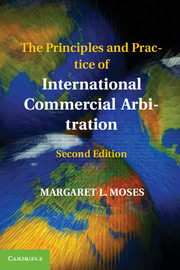Book contents
- Frontmatter
- Contents
- Preface to the Second Edition
- Foreword to the First Edition
- Chapter One Introduction to International Commercial Arbitration
- Chapter Two The Arbitration Agreement
- Chapter Three Drafting the Arbitration Agreement
- Chapter Four Applicable Laws and Rules
- Chapter Five Judicial Assistance for Arbitration
- Chapter Six The Tribunal
- Chapter Seven The Arbitral Proceedings
- Chapter Eight The Award
- Chapter Nine Attempts to Set Aside an Award
- Chapter Ten Enforcement of the Award
- Chapter Eleven Investment Arbitration
- Appendix A The United Nations Convention on the Recognition and Enforcement of Foreign Arbitral Awards (The New York Convention) (1958)
- Appendix B UNCITRAL Model Law on International Commercial Arbitration (original 1985 version)
- Appendix C Revised Articles of the UNCITRAL Model Law on International Commercial Arbitration (2006)
- Appendix D UNCITRAL Recommendation Regarding the Interpretation of Article II, Paragraph 2, and Article VII, Paragraph 1, of the New York Convention
- Appendix E IBA Rules on the Taking of Evidence in International Arbitration
- Appendix F IBA Rules of Ethics for International Arbitrators 1987
- Appendix G IBA Guidelines on Conflicts of Interest in International Arbitration
- Appendix H The AAA–ABA Code of Ethics for Arbitrators in Commercial Disputes
- Appendix I Model Clauses
- Appendix J Useful Arbitration Websites
- Index
- References
Chapter Eleven - Investment Arbitration
Published online by Cambridge University Press: 05 June 2012
- Frontmatter
- Contents
- Preface to the Second Edition
- Foreword to the First Edition
- Chapter One Introduction to International Commercial Arbitration
- Chapter Two The Arbitration Agreement
- Chapter Three Drafting the Arbitration Agreement
- Chapter Four Applicable Laws and Rules
- Chapter Five Judicial Assistance for Arbitration
- Chapter Six The Tribunal
- Chapter Seven The Arbitral Proceedings
- Chapter Eight The Award
- Chapter Nine Attempts to Set Aside an Award
- Chapter Ten Enforcement of the Award
- Chapter Eleven Investment Arbitration
- Appendix A The United Nations Convention on the Recognition and Enforcement of Foreign Arbitral Awards (The New York Convention) (1958)
- Appendix B UNCITRAL Model Law on International Commercial Arbitration (original 1985 version)
- Appendix C Revised Articles of the UNCITRAL Model Law on International Commercial Arbitration (2006)
- Appendix D UNCITRAL Recommendation Regarding the Interpretation of Article II, Paragraph 2, and Article VII, Paragraph 1, of the New York Convention
- Appendix E IBA Rules on the Taking of Evidence in International Arbitration
- Appendix F IBA Rules of Ethics for International Arbitrators 1987
- Appendix G IBA Guidelines on Conflicts of Interest in International Arbitration
- Appendix H The AAA–ABA Code of Ethics for Arbitrators in Commercial Disputes
- Appendix I Model Clauses
- Appendix J Useful Arbitration Websites
- Index
- References
Summary
GROWTH OF FOREIGN INVESTMENT AND INVESTMENT ARBITRATION
Foreign investment is a critical component of the world's economy. Global flows of investment in 2010 amounted to U.S. $1.22 trillion. The United Nations Conference on Trade and Development (UNCTAD) estimates for 2011 that foreign direct investment (FDI) flows will be between $1.3 and $1.5 trillion. Although the highest capital inflows in 2010 in any single country went to the United States, significant increases were attained in Latin American and the Caribbean, as well as in South, East, and Southeast Asia. Because many developing countries do not have the capital, technology, or other resources needed to modernize their infrastructure and develop their industries, foreign investment is seen as crucial to making them more competitive in a global economy. Developed countries, as well, know the importance of attracting foreign investment. Investment to developed countries in 2010 was approximately U.S. $ 526.6 billion. It is thus not surprising that many countries have actively sought ways to encourage foreign investment.
Foreign investors considering major capital-intensive projects such as the financing and development of a power plant, the construction of a 5,000-unit housing project, the building of long-distance oil and gas pipelines, or the development of transportation or communications infrastructure want assurances that their investments will not be taken over (expropriated) by the host country or so undermined by changes in the host country's regulations or laws that the investment is constructively expropriated. They also want a way to resolve disputes that does not depend on the courts of the host country, for fear that they will not receive fair and equal treatment in those courts when the opposing party is the State or a State entity. The need for investors to feel secure in their investments has led national governments to take steps to make their laws and rules more investor friendly. Many have adopted investor protection legislation, and have entered into bilateral and multilateral investment treaties.
- Type
- Chapter
- Information
- Publisher: Cambridge University PressPrint publication year: 2012



